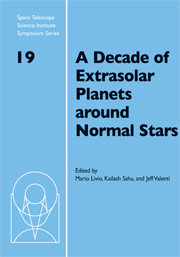 A Decade of Extrasolar Planets around Normal Stars
A Decade of Extrasolar Planets around Normal Stars Book contents
- Frontmatter
- Contents
- Participants
- Preface
- Extrasolar planets: Past, present, and future
- The quest for very low-mass planets
- Extrasolar planets: A galactic perspective
- The Kepler Mission: Design, expected science results, opportunities to participate
- Observations of the atmospheres of extrasolar planets
- Planetary migration
- Observational constraints on dust disk lifetimes: Implications for planet formation
- The evolution of gas in disks
- Planet formation
- Core accretion—gas capture model for gas giant planet formation
- Gravitational instabilities in protoplanetary disks
- Conference summary: The quest for new worlds
Core accretion—gas capture model for gas giant planet formation
Published online by Cambridge University Press: 22 October 2009
- Frontmatter
- Contents
- Participants
- Preface
- Extrasolar planets: Past, present, and future
- The quest for very low-mass planets
- Extrasolar planets: A galactic perspective
- The Kepler Mission: Design, expected science results, opportunities to participate
- Observations of the atmospheres of extrasolar planets
- Planetary migration
- Observational constraints on dust disk lifetimes: Implications for planet formation
- The evolution of gas in disks
- Planet formation
- Core accretion—gas capture model for gas giant planet formation
- Gravitational instabilities in protoplanetary disks
- Conference summary: The quest for new worlds
Summary
The core accretion—gas capture model is generally accepted as the standard formation model for gas giant planets. It proposes that a solid core grows via the accretion of planetesimals, and then captures a massive envelope from the solar nebula gas. Simulations have been successful in explaining many features of giant planets. This chapter will present an overview of the historical and scientific developments of the model, a description of the computer code based on the core accretion hypothesis with a summary of results of recent computer simulations, and the effect the observational achievement of finding extrasolar planets has had on the core accretion—gas capture model.
- Type
- Chapter
- Information
- A Decade of Extrasolar Planets around Normal StarsProceedings of the Space Telescope Science Institute Symposium, held in Baltimore, Maryland May 2–5, 2005, pp. 138 - 152Publisher: Cambridge University PressPrint publication year: 2008
